

RN (Registered Nurse) Cover Letter
Cover letter maker.
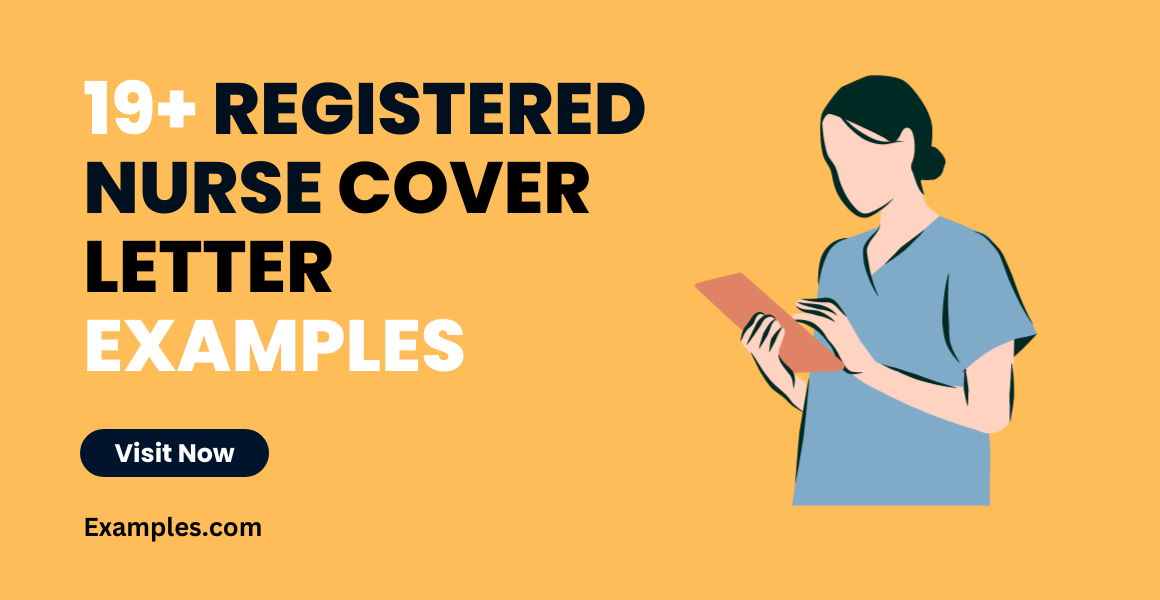
Applying for a Registered Nurse (RN) position requires more than just a strong resume; it demands a well-crafted cover letter that tells your unique nursing story. In an industry where compassion and dedication are key, an RN cover letter provides a personalized touch to your application, showcasing your specific experiences, skills, and why you want to be part of the healthcare team. Let’s explore what an RN cover letter is and how to write one that leaves a lasting impression.
What is an RN (Registered Nurse) Cover Letter?
An RN cover letter is a formal document that accompanies a Registered Nurse’s resume when applying for a nursing position. It serves as an introduction and provides additional context about the applicant’s qualifications, experiences, and reasons for pursuing a career in nursing. Unlike a resume, an RN cover letter allows the candidate to express their personality and elaborate on specific experiences that make them suitable for the position.
What is an Example of a Cover Letter for an RN?
Below is a good cover letter example for RN
[Your Name] [Your Address] [City, State ZIP Code] [Your Phone Number] [Your Email Address]
[Hiring Manager’s Name] [Hospital/Healthcare Facility Name] [Address] [City, State ZIP Code]
Dear [Hiring Manager’s Name],
I am writing to apply for the Registered Nurse position at [Hospital/Healthcare Facility Name], as advertised on [where you found the job posting]. With a Bachelor’s Degree in Nursing and [Number] years of hands-on experience in a [specific field, e.g., pediatric, emergency], I am confident in my ability to provide top-notch patient care and contribute positively to your team.
At [Previous Employer], I was responsible for [briefly describe your responsibilities, e.g., administering medications, creating care plans, assisting with surgeries]. My dedication to patient well-being and my ability to work well under pressure have been recognized by both colleagues and supervisors.
What excites me about the opportunity at [Hospital/Healthcare Facility Name] is your commitment to [mention something specific about the hospital/healthcare facility, e.g., innovative treatments, community outreach]. I believe that my skills and values align perfectly with the mission of your institution, and I look forward to the possibility of contributing to your team.
Enclosed is my resume, detailing my professional journey in nursing. I welcome the opportunity to discuss how my experience and passion for nursing can align with the needs of your organization.
Thank you for considering my application. I look forward to hearing from you soon.
[Your Full Name]
[Enclosure: Resume]
This example demonstrates a well-structured RN cover letter. It provides the essential details about the applicant’s qualifications, personalizes the content to the specific institution, and expresses genuine interest in the role. Utilizing such an approach will make your application stand out in the competitive field of nursing.
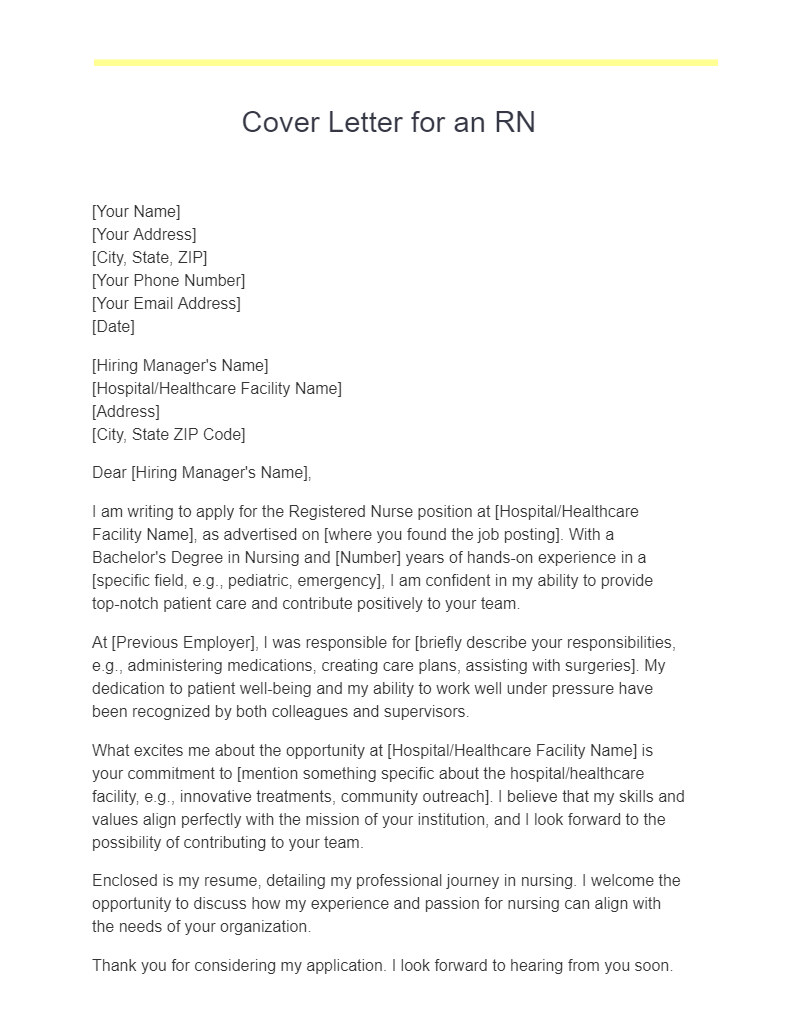
Size: 29 KB
Free RN Cover Letters – Copy & Paste
Rn cover letter format.
Here’s a great example of a cover letter that can be used as a general template:
[Hiring Manager’s Name] [Hospital Name] [Address] [City, State ZIP Code]
I am excited to submit my application for the Registered Nurse position at [Hospital Name], as advertised on [Job Board/Website]. With a [Your Degree] and [Number of Years] experience in [Specialized Area], I am confident in my abilities to provide excellent care and contribute to your esteemed healthcare team.
[Include a paragraph detailing your professional experience, specific responsibilities, accomplishments, and how they relate to the role you’re applying for.]
Your hospital’s dedication to [mention a particular aspect you admire about the hospital, e.g., patient-centered care, innovative practices] resonates with my professional ethos. I am particularly interested in your [specific department or program], where I believe my skills would be most beneficial.
Enclosed is my resume for your review. I look forward to the opportunity to discuss in further detail how my qualifications align perfectly with the needs of [Hospital Name].
Thank you for considering my application.
To use this cover letter template effectively, you’ll want to personalize the information by replacing the bracketed sections with your specific details. Make sure to align your experiences and skills to match the particular role you’re applying for and highlight the hospital’s unique attributes that resonate with your career goals or values. Keep the tone professional and polite, expressing gratitude for their consideration of your application.
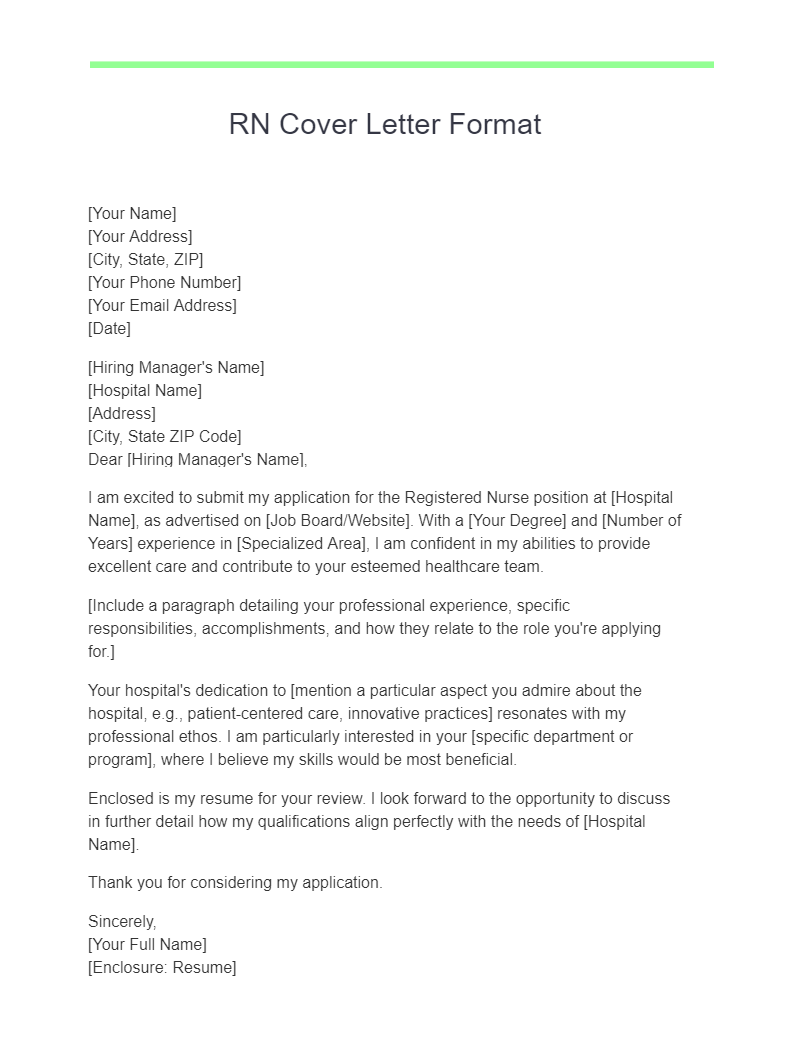
Size: 28 KB
RN Cover Letter Without/ No Experience Example
Applying for an RN position without prior professional experience can be challenging, but focusing on your educational background, internships, and transferrable skills can create a strong impression. Here’s an example:
I recently graduated from [Your College/University] with a degree in Nursing and am excited to apply for the Registered Nurse position at [Hospital Name]. Although I have not yet had the opportunity to work as a Registered Nurse, my educational background and clinical internships have equipped me with the foundational skills necessary to excel in this role.
During my studies, I completed [number] hours of clinical training in areas such as [mention specific areas like emergency care, pediatric nursing, etc.]. This hands-on experience, coupled with my dedication to providing compassionate care, has prepared me to take on the challenges of a professional nursing role.
I am impressed by [Hospital Name]’s commitment to [mention a specific aspect, e.g., community outreach, cutting-edge treatments], and I believe that I can contribute fresh insights and energy to your team.
Enclosed is my resume, highlighting my academic achievements and clinical experiences. I would be thrilled to discuss how I can contribute to [Hospital Name] as a Registered Nurse.
Writing an RN cover letter without experience requires emphasis on education and training. Focus on your academic achievements, internships, and any relevant training or certifications. Highlight any transferrable skills from other fields, such as teamwork, communication, or problem-solving. Express your genuine interest in the facility by mentioning specific programs or initiatives you admire, and maintain a formal and respectful tone throughout. By considering these aspects, you can craft a compelling cover letter even without professional experience.
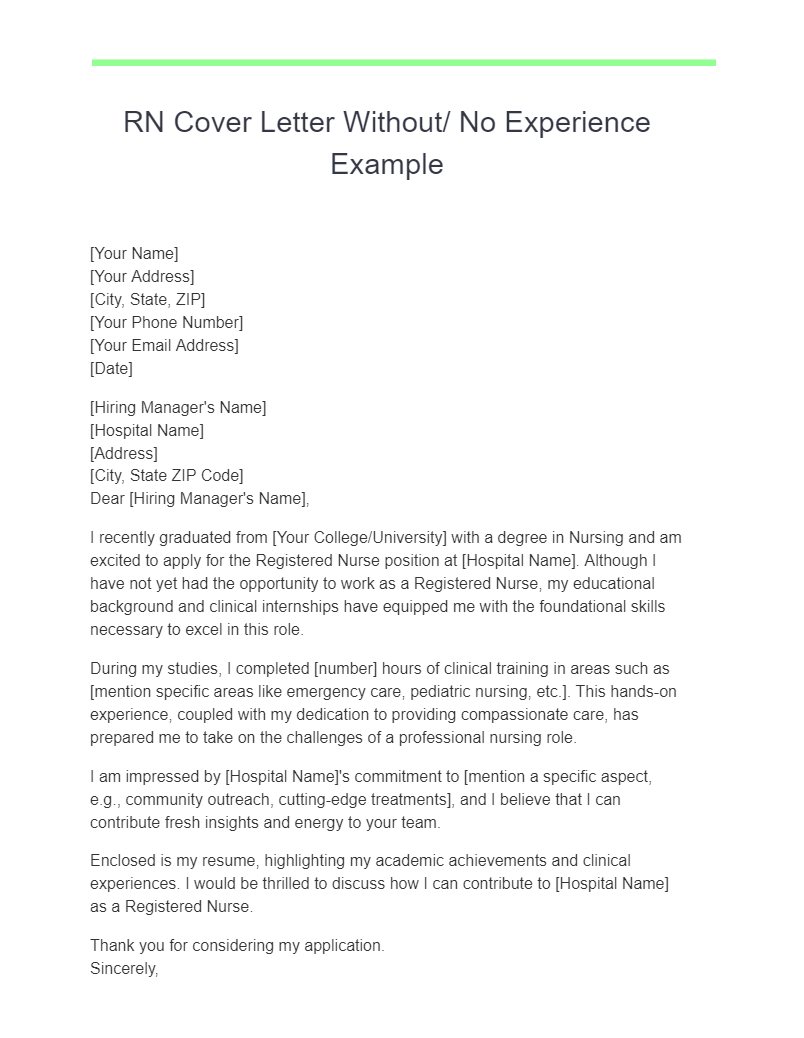
New Grad RN Cover Letter Example
A new graduate RN cover letter needs to emphasize education, clinical experiences, and enthusiasm for the nursing profession. Here’s an example:
I am thrilled to apply for the Registered Nurse position at [Hospital Name] as a recent graduate from [Your College/University] with a [Your Degree]. My extensive academic background, combined with hands-on clinical experience, has prepared me for the exciting challenges and opportunities in nursing.
During my education, I completed [number] hours of clinical rotations in [mention specific areas], where I learned [specific skills or experiences that relate to the job]. I was particularly inspired by [mention something specific you learned or experienced that fuels your passion for nursing].
I have attached my resume for your review, and I look forward to the opportunity to discuss how my fresh perspective and dedication to patient care align with the values of [Hospital Name].
In New Graduate cover letter , it’s essential to emphasize your educational achievements, clinical rotations, and any special projects or honors that relate to nursing. Showcase your enthusiasm for the profession and highlight how your skills and interests align with the hospital or facility’s mission and values. Personalize the letter to the specific role and maintain a professional and optimistic tone.
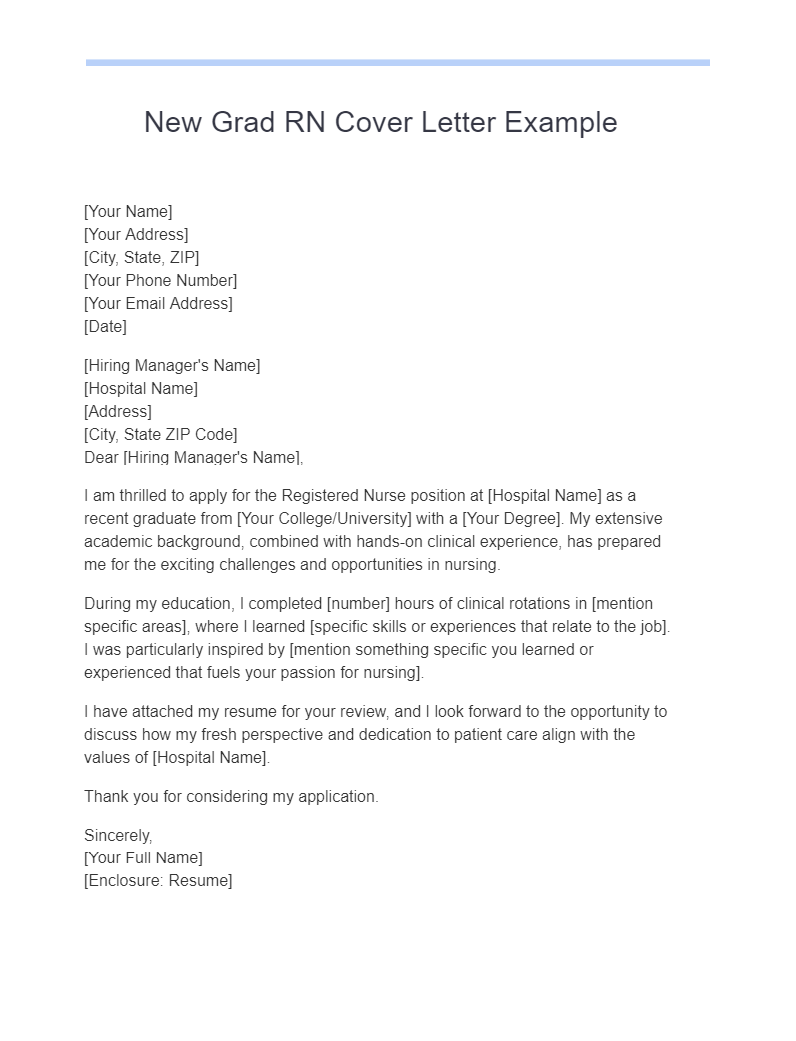
Size: 27 KB
Pediatric RN Cover Letter Example
A Pediatric RN cover letter should focus on skills and experiences specifically related to child care and pediatric nursing. Here’s an example:
[Hiring Manager’s Name] [Children’s Hospital Name] [Address] [City, State ZIP Code]
I am applying for the Pediatric Registered Nurse position at [Children’s Hospital Name], a role that combines my passion for children’s healthcare with my professional skills as a nurse. With [Number of Years] experience in pediatric care, I believe I am an ideal fit for your team.
In my current role at [Previous Hospital/Healthcare Facility], I [describe specific responsibilities, achievements, or experiences related to pediatric nursing]. My dedication to providing gentle and compassionate care to children and their families has been a rewarding aspect of my career.
I am particularly drawn to [Children’s Hospital Name] due to your [mention a specific program, initiative, or aspect that interests you].
Enclosed is my resume for your review. I look forward to discussing how my specialized skills in pediatric care can contribute to the exceptional work being done at [Children’s Hospital Name].
When crafting a Pediatric RN cover letter, it’s essential to emphasize your experience, training, and passion for children’s healthcare. Highlight specific examples of your work with children and their families and align your skills with the facility’s mission and programs. Personalize the letter by mentioning something unique about the hospital or facility that resonates with your career goals or values. Keep the tone professional and compassionate, reflecting your commitment to pediatric care.
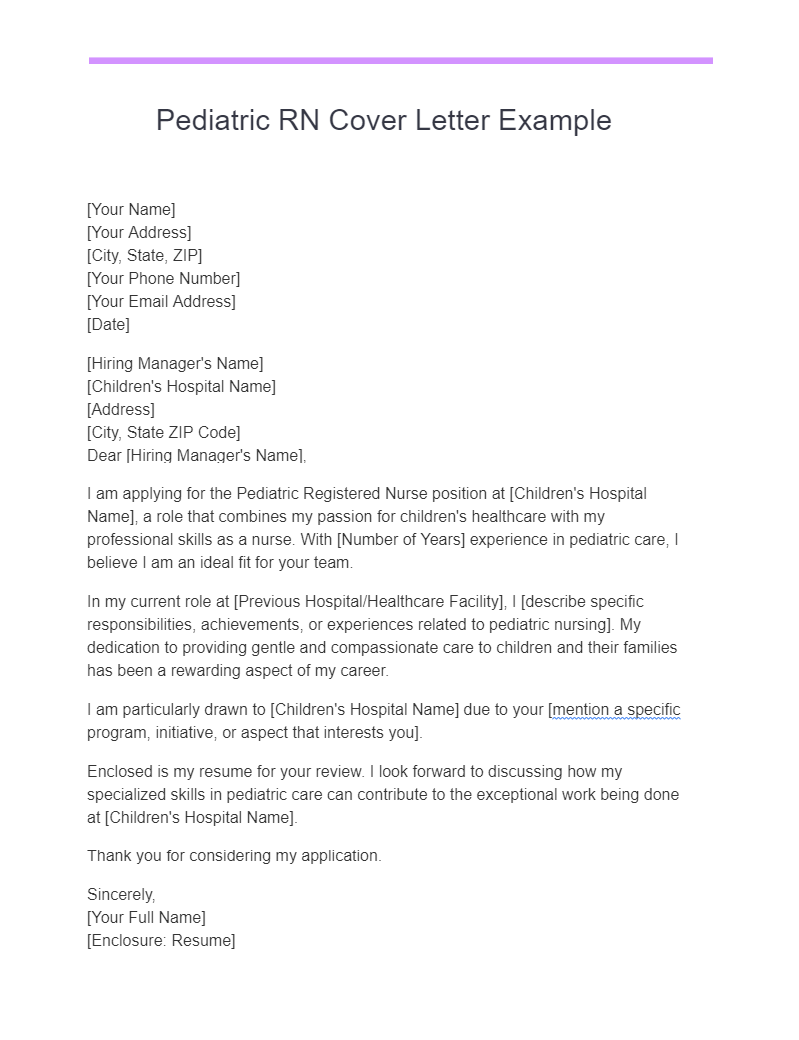
Registered Nurse Cover Letter Example
A Registered Nurse cover letter should concisely present your qualifications, experiences, and commitment to providing quality patient care. Here’s an example:
[Hiring Manager’s Name] [Healthcare Facility Name] [Address] [City, State ZIP Code]
I am excited to apply for the Registered Nurse position at [Healthcare Facility Name]. With [Number of Years] of experience in various medical settings, I have honed my nursing skills to provide top-notch care to patients.
I currently work at [Current Hospital/Healthcare Facility], where I [describe specific responsibilities or achievements that are relevant to the RN position]. My commitment to patient care, collaboration with medical teams, and continuous learning have been key to my success.
I am impressed by [Healthcare Facility Name]’s [mention something specific about the facility, like a program, reputation, or mission]. I believe my background aligns perfectly with the values and goals of your team.
Please find my resume enclosed. I look forward to the opportunity to discuss my qualifications in more detail.
A Registered Nurse cover letter must demonstrate your professional experience, key nursing skills, and dedication to patient care. Tailor the content to the specific role by mentioning relevant experiences and achievements. Highlight aspects of the healthcare facility that align with your career goals or interests. Maintain a concise and professional tone, ensuring that your passion for nursing shines through.
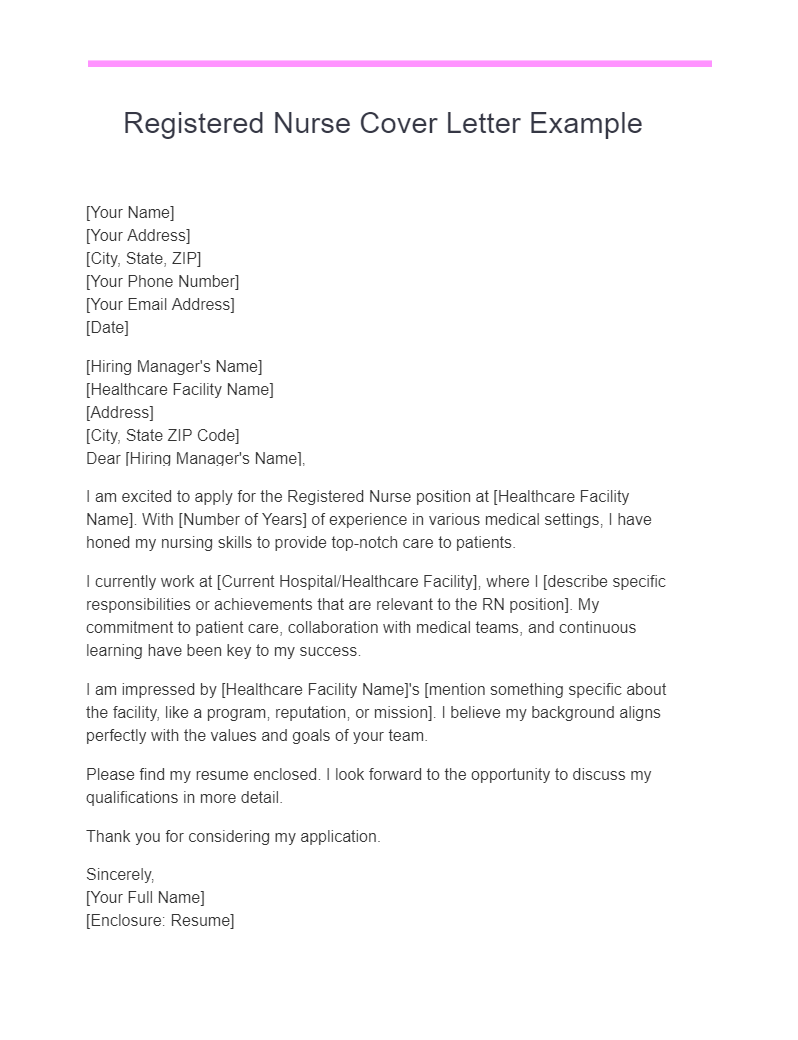
Sample RN Cover Letter Example
A sample RN cover letter can help guide you in crafting your personalized application. Here’s an example:
I am writing to express my interest in the Registered Nurse position at [Healthcare Facility Name]. With a diverse background in nursing, including [specific areas of expertise or experience], I am confident in my ability to contribute positively to your team.
At my current role at [Current Hospital/Healthcare Facility], I have [mention specific responsibilities, achievements, or skills that relate to the RN role]. I am committed to continuing my professional growth and delivering exceptional care to patients.
I admire [Healthcare Facility Name]’s dedication to [mention a specific program, initiative, or mission that attracts you]. I believe my skills and values align well with your organization.
Enclosed is my resume for your review. I look forward to the opportunity to discuss my qualifications further.
A sample RN cover letter should serve as a template to help you craft your unique application. Focus on showcasing your nursing skills, experiences, and any specialized areas of expertise that are relevant to the role. Personalize the letter by mentioning specific aspects of the healthcare facility that resonate with you. Keep the content concise and professional, highlighting your genuine interest in the position and dedication to nursing.
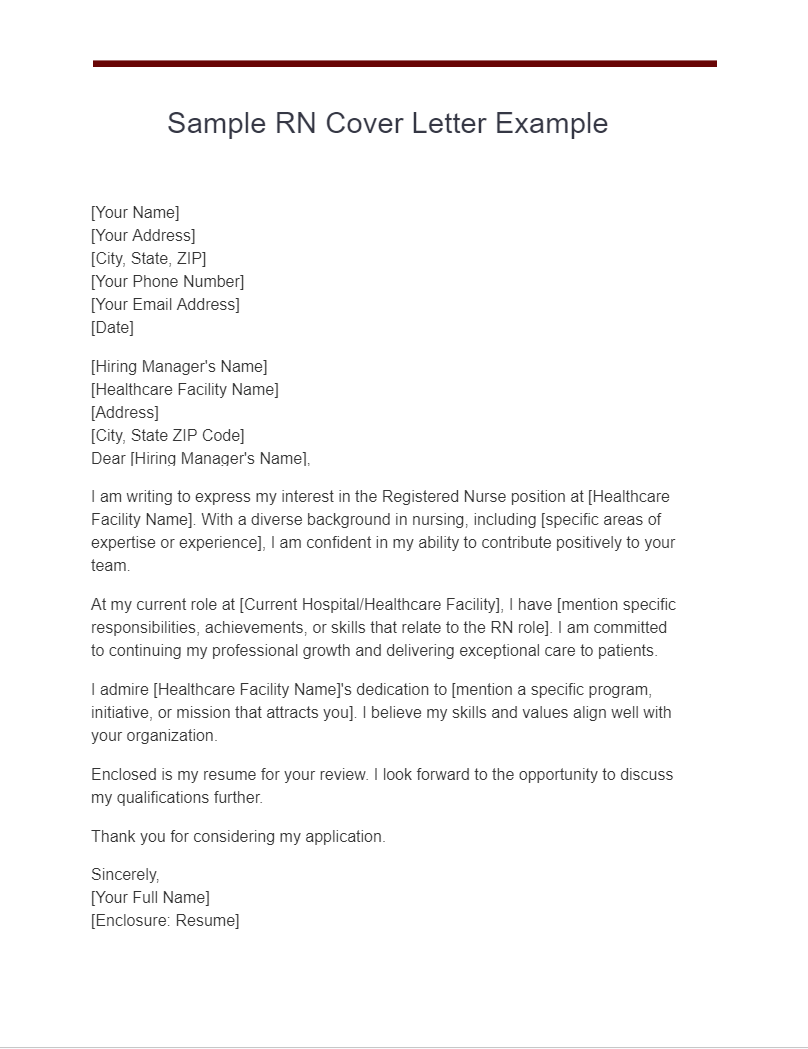
Graduate RN Cover Letter Example
A graduate RN cover letter should showcase your education, enthusiasm, and readiness to embark on your nursing career. Here’s an example:
I am thrilled to apply for the Registered Nurse position at [Healthcare Facility Name] as a recent graduate of [Nursing School Name]. My educational background and hands-on clinical experiences have prepared me to transition smoothly into a professional nursing role.
During my clinical rotations, I [describe specific responsibilities or achievements, such as patient care, collaboration, or special projects]. I was consistently praised for my attention to detail, empathy, and commitment to patient-centered care.
I am particularly attracted to [Healthcare Facility Name] because of [mention specific programs, values, or initiatives that align with your goals]. I believe I can contribute positively to your team and uphold the high standards of care you are known for.
Enclosed is my resume, and I look forward to the opportunity to discuss my qualifications in further detail.
For a Graduate RN cover letter, focus on your educational achievements, clinical rotations, and eagerness to start your nursing career. Emphasize specific experiences that highlight your potential as a nurse. Tailor your content to the facility’s mission and values, showing why you are a great fit for their team. Maintain a positive tone that reflects your enthusiasm for the role.
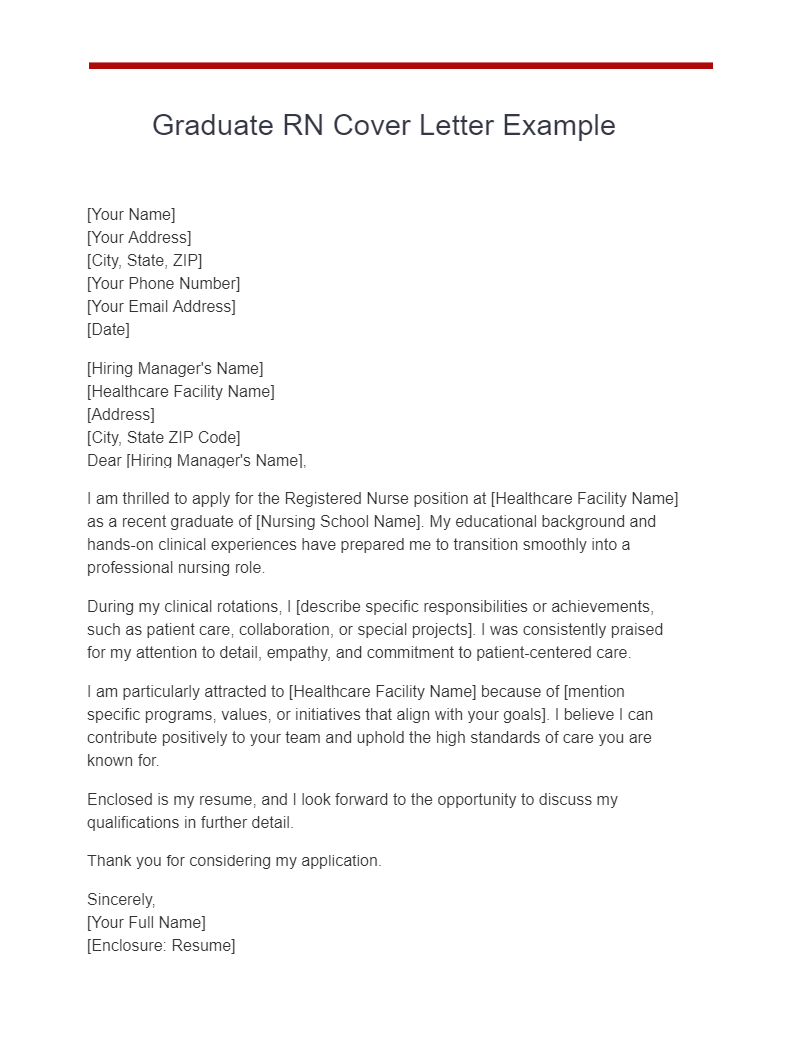
ICU Registered Nurse Cover Letter Example
Intensive Care Unit (ICU) Registered Nurses have specialized skills and experiences that should be highlighted. Here’s an example:
I am writing to apply for the ICU Registered Nurse position at [Healthcare Facility Name]. With [Number of Years] of experience in critical care nursing, I have developed a strong foundation in providing compassionate, evidence-based care to critically ill patients.
At my current position in [Current Hospital’s ICU Department], I [mention specific responsibilities or achievements, such as patient assessments, care planning, or collaboration with medical teams]. I am well-versed in the latest ICU technologies and protocols, and I continually strive to enhance my skills.
I am drawn to [Healthcare Facility Name]’s reputation for excellence in critical care and believe my expertise aligns with your team’s high standards.
An ICU Registered Nurse cover letter should emphasize your specialized experience in intensive care, including skills, technologies, and patient care protocols. Highlight achievements that demonstrate your ability to thrive in a high-stress environment. Personalize the letter to the specific healthcare facility by mentioning what attracts you to their ICU department. Maintain a professional and confident tone.
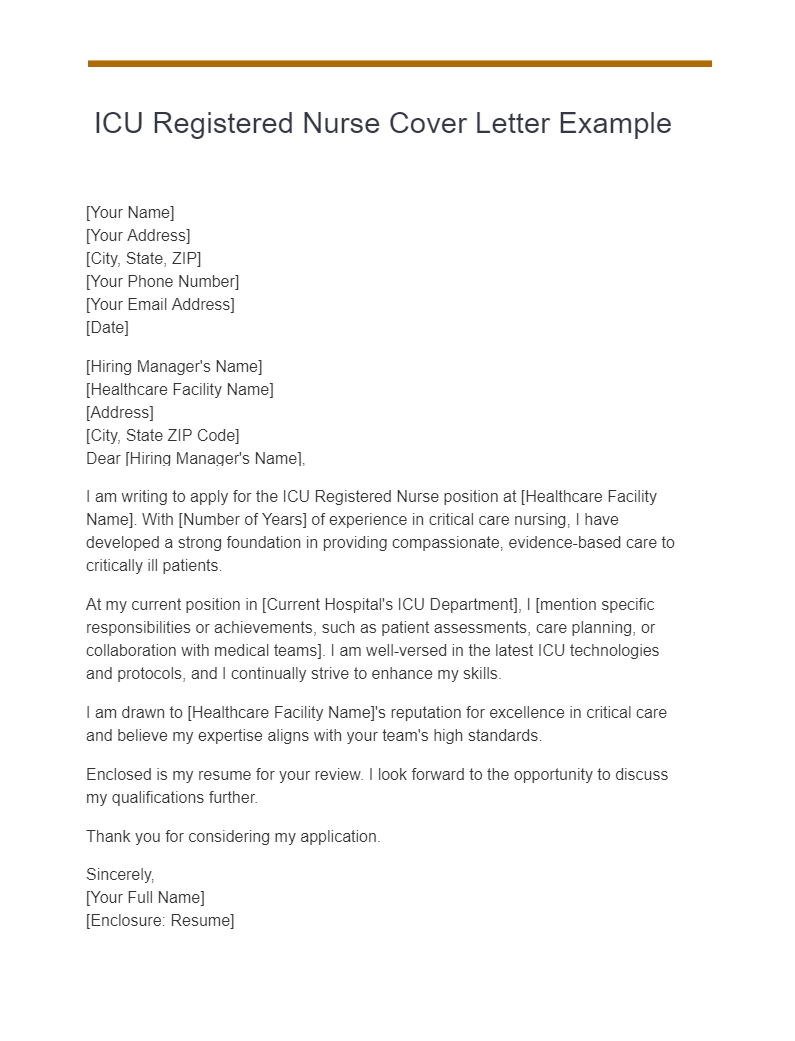
Med Surg Cover Letter Example
Medical-Surgical (Med Surg) Nurses work in a challenging and multifaceted environment. Here’s an example to help you apply for a Med Surg nursing role:
I am excited to submit my application for the Medical-Surgical Nurse position at [Healthcare Facility Name]. With [Number of Years] years of experience in Med Surg nursing, I have honed my skills in patient care, treatment planning, and teamwork.
In my current role at [Current Hospital’s Med Surg Department], I have [mention specific responsibilities or achievements such as managing a diverse caseload, collaborating with interdisciplinary teams, or improving patient outcomes]. My adaptability and attention to detail have been vital to my success.
I am drawn to [Healthcare Facility Name] because of [mention specific programs, values, or initiatives]. I am confident that I can contribute positively to your nursing team.
Enclosed is my resume for your review. I look forward to discussing my qualifications in more detail.
In a Med Surg cover letter, highlight your experience in managing various medical and surgical conditions, working with diverse patient populations, and collaborating with interdisciplinary teams. Emphasize your adaptability, attention to detail, and commitment to patient care. Tailor the content to reflect the specific facility’s values and mission, showing how you align with their goals.
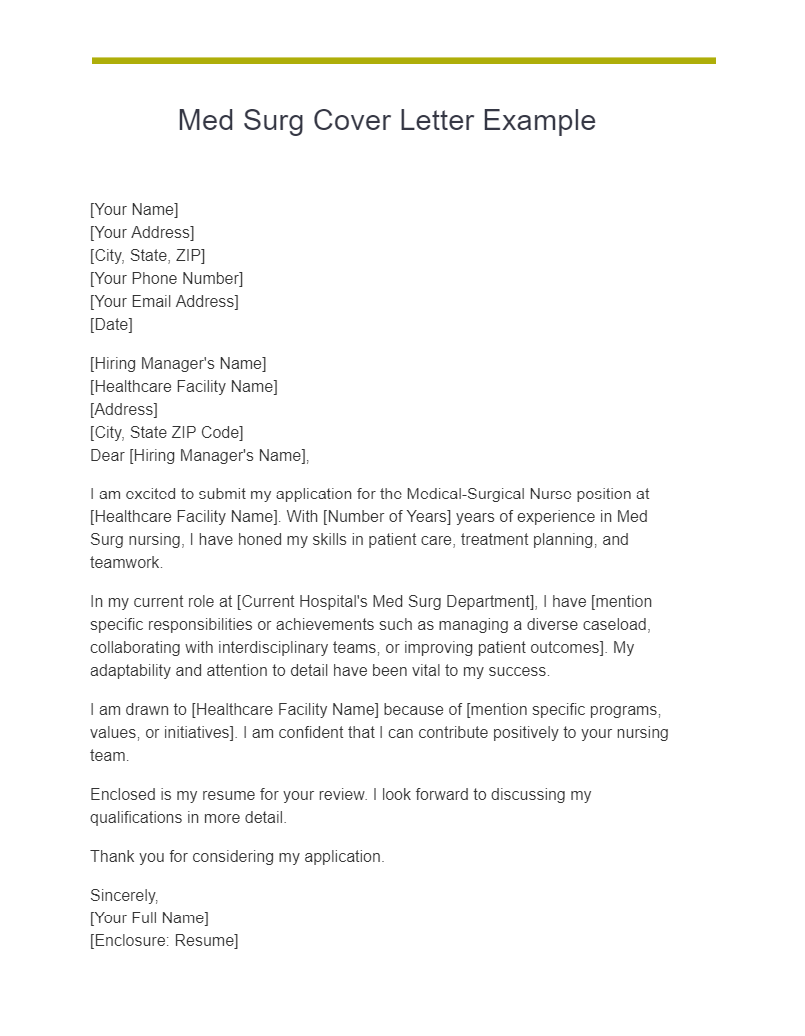
Staff Nurse Cover Letter Example
Staff Nurses play a critical role in healthcare facilities, providing direct patient care and support. Here’s an example:
I am writing to apply for the Staff Nurse position at [Healthcare Facility Name]. With a robust background in nursing and a dedication to patient-centered care, I believe I am an ideal candidate for this role.
During my [Number of Years] years as a Staff Nurse at [Previous Hospital], I [describe specific responsibilities or achievements, such as patient assessments, care coordination, or staff mentoring]. My strong communication skills and collaborative approach have contributed to positive patient outcomes.
I admire [Healthcare Facility Name]’s commitment to [mention specific values, programs, or initiatives], and I am eager to contribute my skills and expertise to your team.
A Staff Nurse cover letter should focus on your nursing experience, collaboration skills, and commitment to patient care. Highlight specific responsibilities or achievements that demonstrate your proficiency in nursing practice. Personalize the content to reflect the healthcare facility’s values and mission, and show how you can contribute positively to their team.
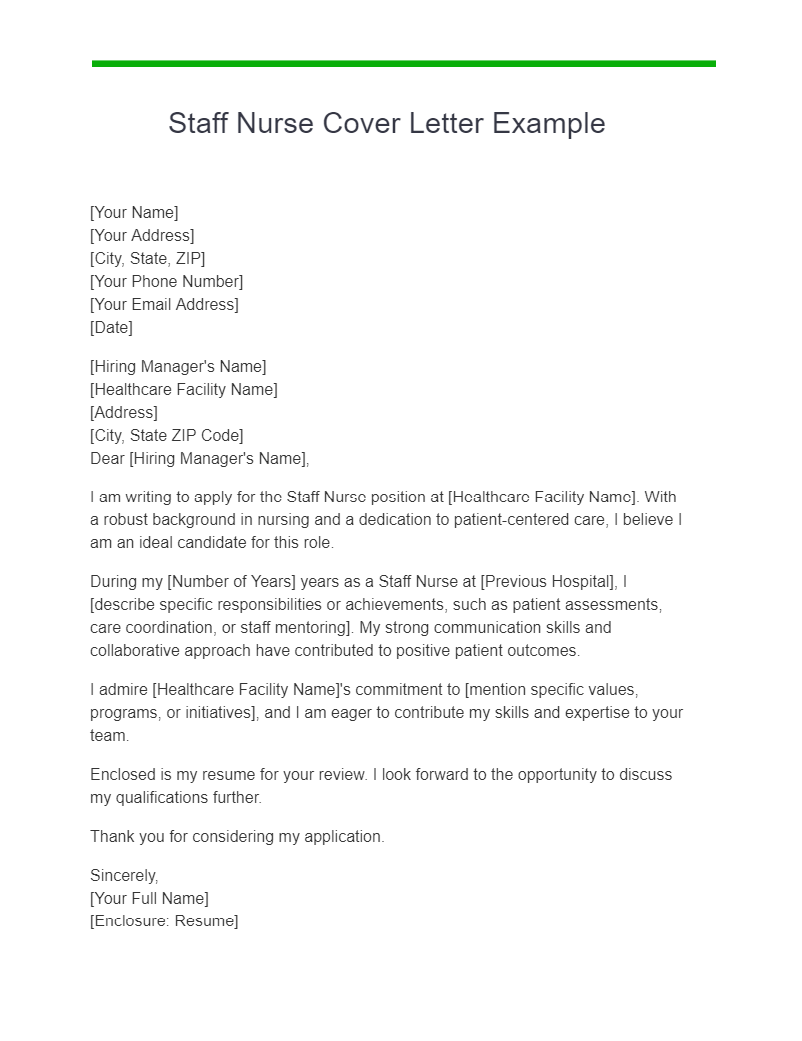
Nursing Student Cover Letter Example
Nursing students, whether pursuing an RN, BSN, or another nursing program, often need to write cover letters for internships or entry-level positions. Here’s a guide for nursing students:
I am writing to apply for the [Specific Nursing Position] at [Healthcare Facility Name]. As a nursing student at [University Name] with [Number of Years or Semesters] of academic and clinical experience, I am eager to bring my passion for healthcare and dedication to patient well-being to your team.
During my studies, I have gained hands-on experience in [specific nursing areas, e.g., patient assessments, care planning, administering medications]. My clinical rotations at [Hospital or Clinic Name] taught me valuable skills in [mention skills, e.g., teamwork, communication, critical thinking].
I admire [Healthcare Facility Name]’s focus on [mention specific values, programs, or initiatives] and believe I can make a positive contribution as a [Specific Nursing Position].
Enclosed is my resume for your consideration. I look forward to the opportunity to discuss my qualifications further.
As a nursing student, your student cover letter should emphasize your academic achievements, clinical experience, and commitment to patient care. Highlight specific skills you have learned during your studies and how they apply to the role you are seeking. Be sure to tailor the content to the specific facility’s values and mission.
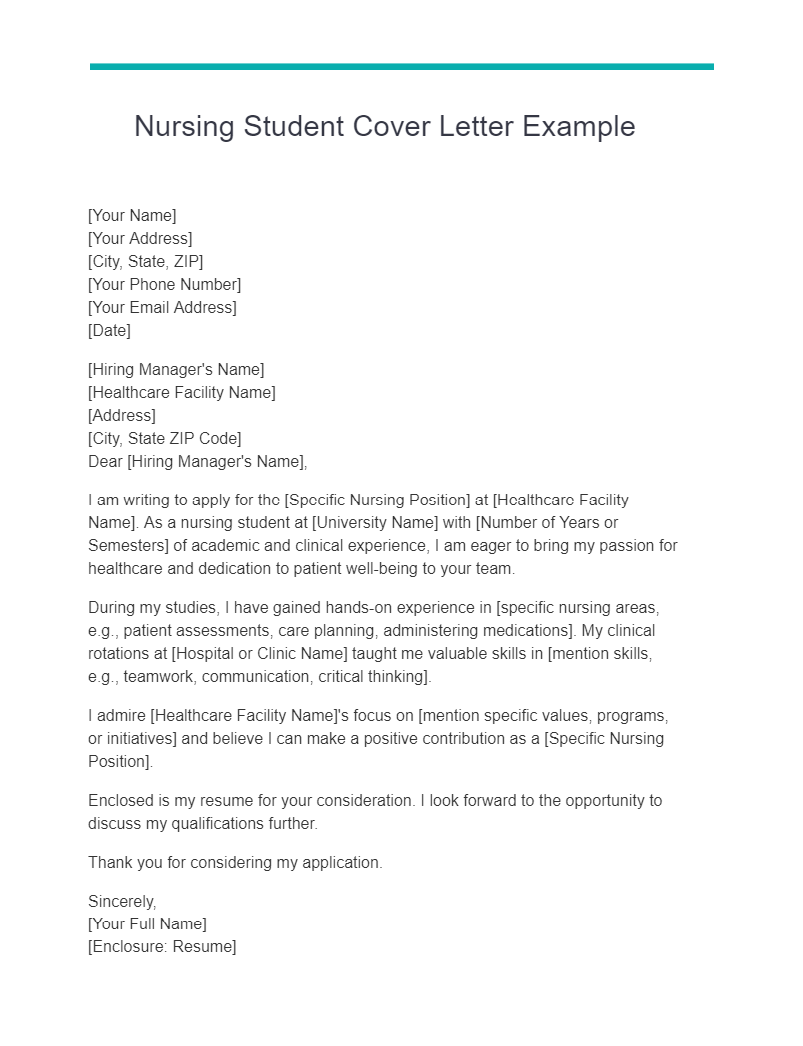
Professional RN Cover Letter Example
A professional RN cover letter reflects a seasoned nursing professional’s skills, expertise, and contributions to healthcare. Here’s an example:
I am writing to apply for the Registered Nurse position at [Healthcare Facility Name]. With [Number of Years] years of experience in various healthcare settings, I bring extensive knowledge, leadership skills, and a track record of improving patient outcomes.
At [Current or Previous Workplace], I spearheaded initiatives to [describe specific achievements, e.g., reduce patient readmission rates, improve staff training, enhance patient satisfaction]. My collaboration with multidisciplinary teams has been central to my success.
I am drawn to [Healthcare Facility Name] because of its [mention specific values, programs, or initiatives]. I believe I can contribute substantially to your goals as a Registered Nurse.
Enclosed is my resume for your review. I look forward to discussing how I can contribute to [Healthcare Facility Name].
For a Professional RN cover letter, emphasize your extensive nursing experience, leadership qualities, and specific achievements that demonstrate your value. Align your qualifications with the facility’s values and mission, and articulate how you can contribute positively to their team.
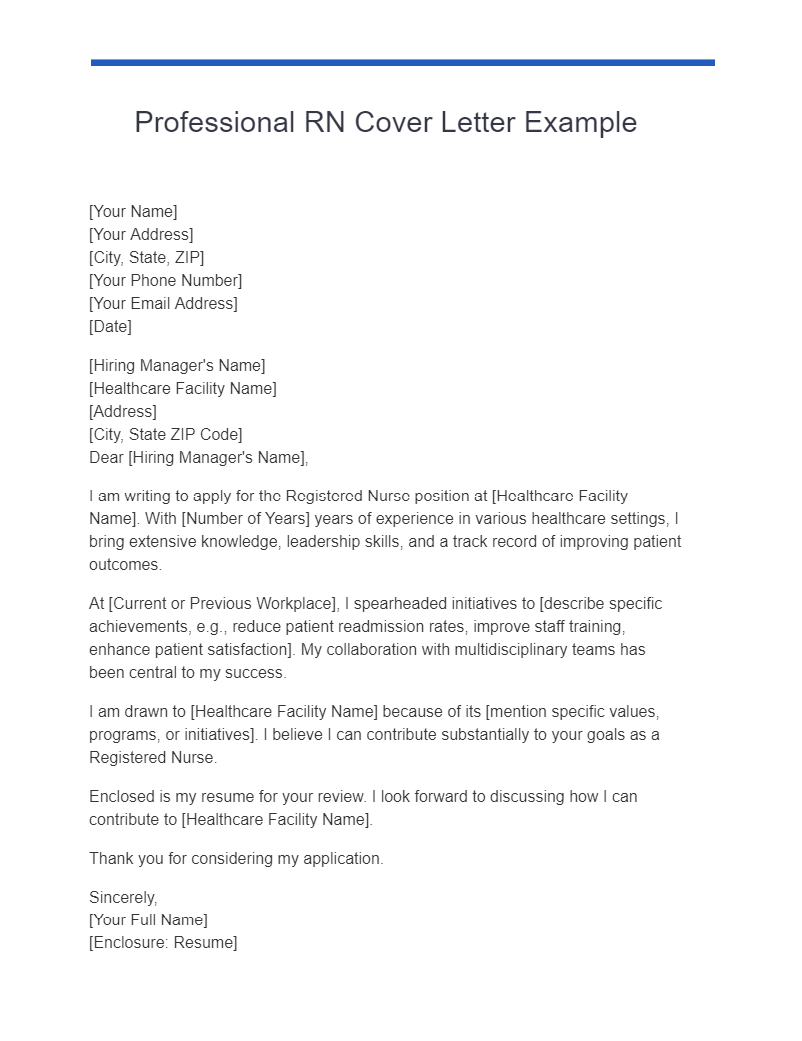
RN Cover Letter for Resume Example
When attaching an RN cover letter to your resume , ensure it complements the information in your resume and adds additional context. Here’s an example:
I am applying for the Registered Nurse position at [Healthcare Facility Name], as advertised. With a strong foundation in nursing practice and a commitment to patient-centered care, I believe I can be a valuable addition to your team.
In my current role at [Current Hospital or Clinic], I have had the opportunity to [describe specific responsibilities, achievements, or initiatives that align with the job description]. My ability to adapt to various clinical environments and collaborate effectively with healthcare professionals sets me apart.
I am impressed by [Healthcare Facility Name]’s [mention specific values, programs, or initiatives], and I see a strong alignment between your goals and my professional values.
Enclosed is my resume for your consideration. I look forward to discussing my qualifications further.
When crafting an RN cover letter for your resume, focus on how your qualifications and experience align with the specific role and the healthcare facility’s values. Provide examples that complement the information in your resume, offering additional insight into your skills, achievements, and professional interests.
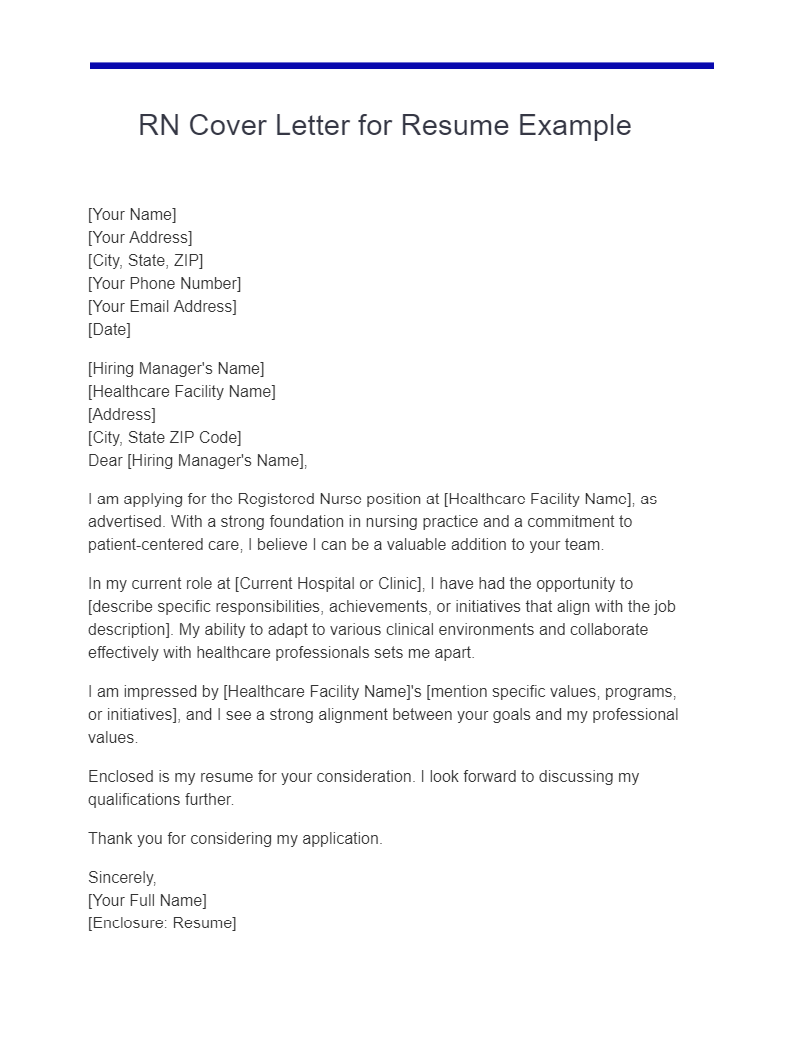
General RN Cover Letter Example
I am writing to apply for the Registered Nurse position at [Healthcare Facility Name]. With a rich background in nursing and a commitment to patient care, I bring a comprehensive skill set that I believe fits perfectly with your team’s values.
In my current role at [Current Healthcare Facility], I have honed my abilities in [mention skills such as patient care, team collaboration, record-keeping], contributing to an increase in patient satisfaction scores. My passion for nursing is reflected in my daily interaction with patients and healthcare professionals alike.
I admire [Healthcare Facility Name]’s approach to [mention specific values, programs, or initiatives], and I am excited about the opportunity to contribute my expertise to such a dynamic environment.
Enclosed is my resume for your review. I look forward to discussing my qualifications further.
A general cover letter should be adaptable and applicable to various RN positions. Focus on key skills and experiences that demonstrate your versatility and commitment to patient care. Tailor your letter to the specific facility and role you are applying to, highlighting your alignment with their mission and values.
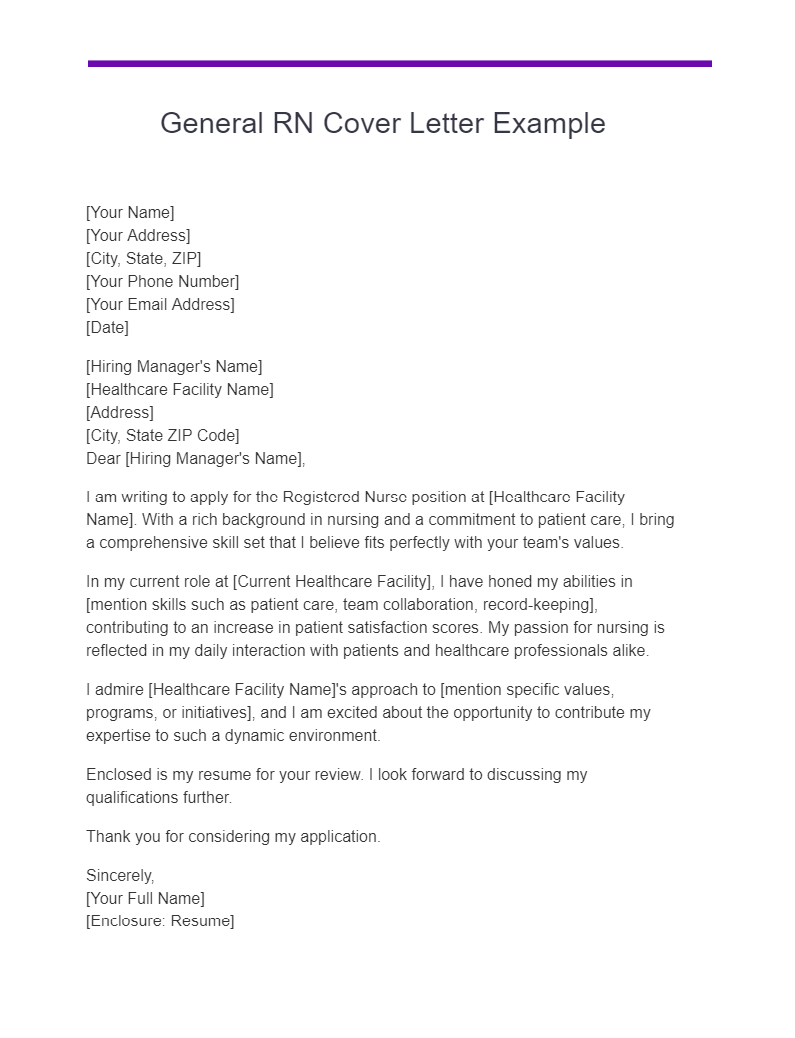
Postpartum RN Cover Letter Example
I am writing to express my interest in the Postpartum Registered Nurse position at [Healthcare Facility Name]. With specialized experience in postpartum care, I am dedicated to providing compassionate support to mothers and newborns during this critical period.
In my current position at [Current Hospital or Clinic], I have successfully managed the care of [number of patients] postpartum patients, focusing on [mention specific aspects such as monitoring vital signs, lactation support, emotional well-being]. My approach emphasizes education, empathy, and evidence-based practices.
I am particularly drawn to [Healthcare Facility Name] because of its commitment to [mention specific values, programs, or initiatives related to postpartum care]. I believe my skills and passion align perfectly with your goals.
When crafting a cover letter for a postpartum RN role, focus on your specialized skills and experiences in this area. Detail your approach to postpartum care and how you personalize it to meet the unique needs of each patient. Demonstrate your alignment with the facility’s values and initiatives related to maternal and newborn care.
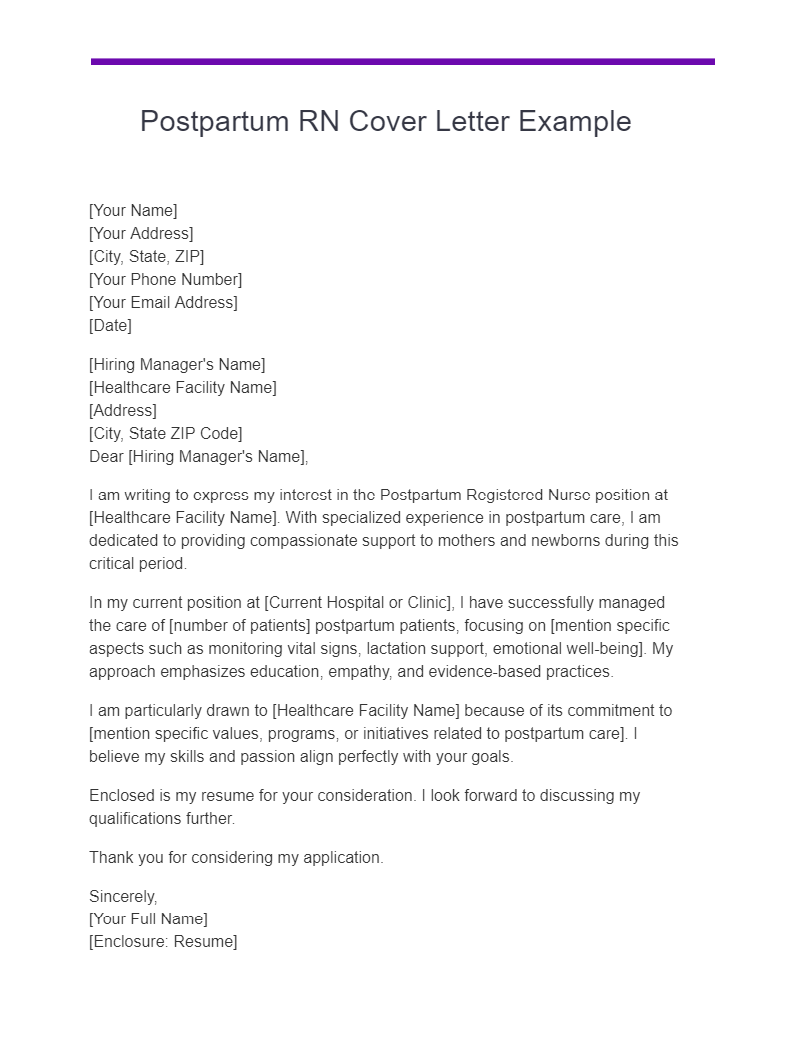
Short RN Cover Letter Example
I am applying for the Registered Nurse position at [Healthcare Facility Name]. With [Number of Years] years of experience, I have honed my skills in patient care, team collaboration, and clinical judgment.
I admire [Healthcare Facility Name]’s commitment to [specific values or initiatives] and believe my expertise aligns with your goals.
Enclosed is my resume. I look forward to the opportunity to discuss my qualifications further.
A short cover letter should be concise yet impactful. Focus on key skills, experiences, and your alignment with the facility’s values. Though brief, ensure it conveys your enthusiasm and suitability for the role.
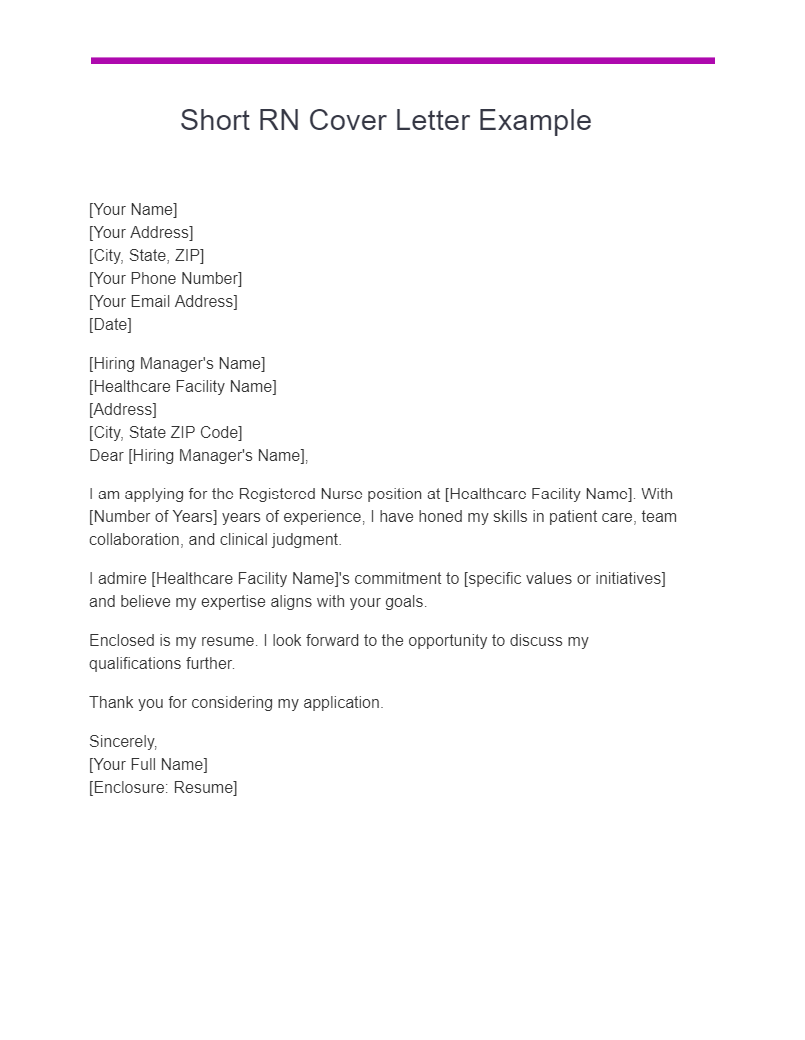
Size: 26 KB
Nurse Practitioner RN Cover Letter Example
I am writing to apply for the Nurse Practitioner position at [Healthcare Facility Name]. As a Registered Nurse with advanced practice certification, I bring a combination of clinical expertise and leadership abilities to foster patient-centered care.
At [Current Healthcare Facility], I have taken on roles that involve [describe specific responsibilities and achievements such as diagnosing illnesses, prescribing treatments, mentoring staff]. My focus on evidence-based practice and continuous professional development has led to improved patient outcomes.
I am particularly drawn to [Healthcare Facility Name] due to its [mention specific values, programs, or initiatives]. I see great potential for contributing my skills and knowledge as a Nurse Practitioner to your esteemed organization.
When writing a cover letter for a Nurse Practitioner role, emphasize your advanced practice skills, leadership qualities, and commitment to evidence-based care. Detail specific achievements that demonstrate your capability in this advanced role and align your values with those of the healthcare facility.
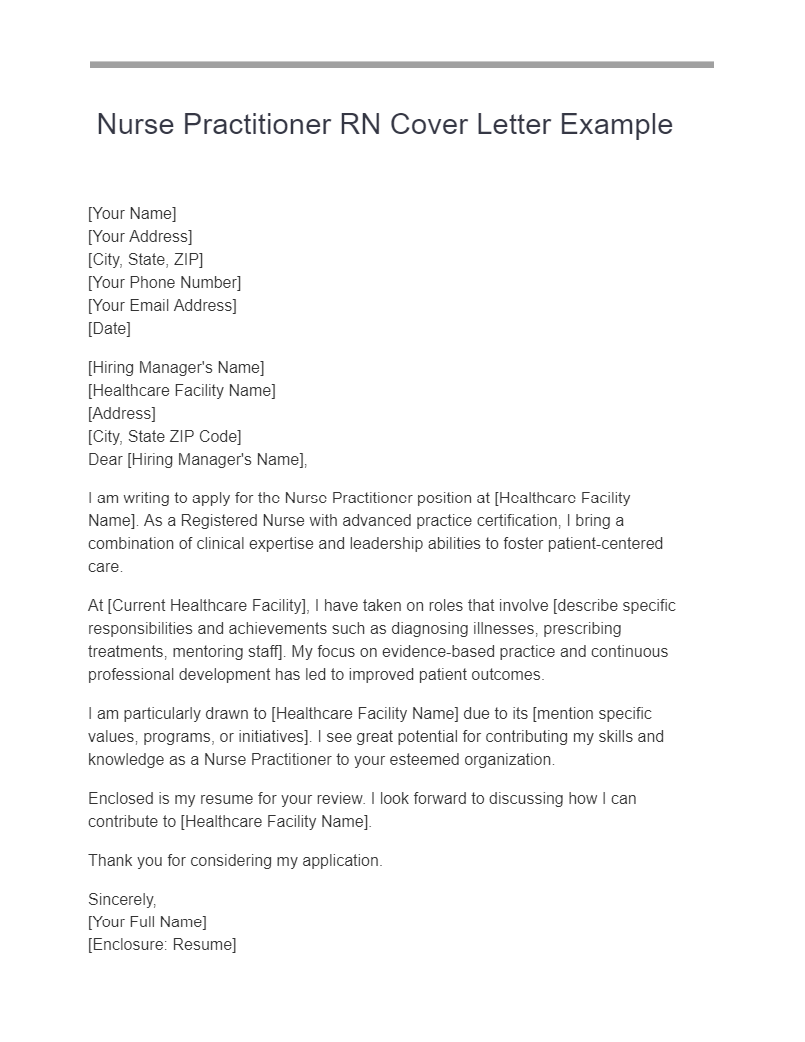
Remote RN Cover Letter Example
[Hiring Manager’s Name] [Healthcare Organization Name] [Address] [City, State ZIP Code]
I am writing to apply for the Remote Registered Nurse position at [Healthcare Organization Name]. With extensive experience in telehealth and remote nursing, I bring a strong ability to provide compassionate and efficient care from a distance.
During my tenure at [Current Organization], I have managed [specific tasks such as patient consultations, telehealth appointments, remote monitoring], ensuring that patients receive timely and quality care. My skills in communication, technology, and patient education have proven essential in this role.
I admire [Healthcare Organization Name]’s innovative approach to remote healthcare, and I believe my expertise aligns perfectly with your goals and values.
Enclosed is my resume for your review. I look forward to discussing how I can contribute to your remote healthcare team.
A Remote RN cover letter should highlight your experience and skills specific to remote and telehealth nursing. Detail how you have adapted traditional nursing practices to a virtual environment and how your abilities align with the organization’s innovative healthcare approach.
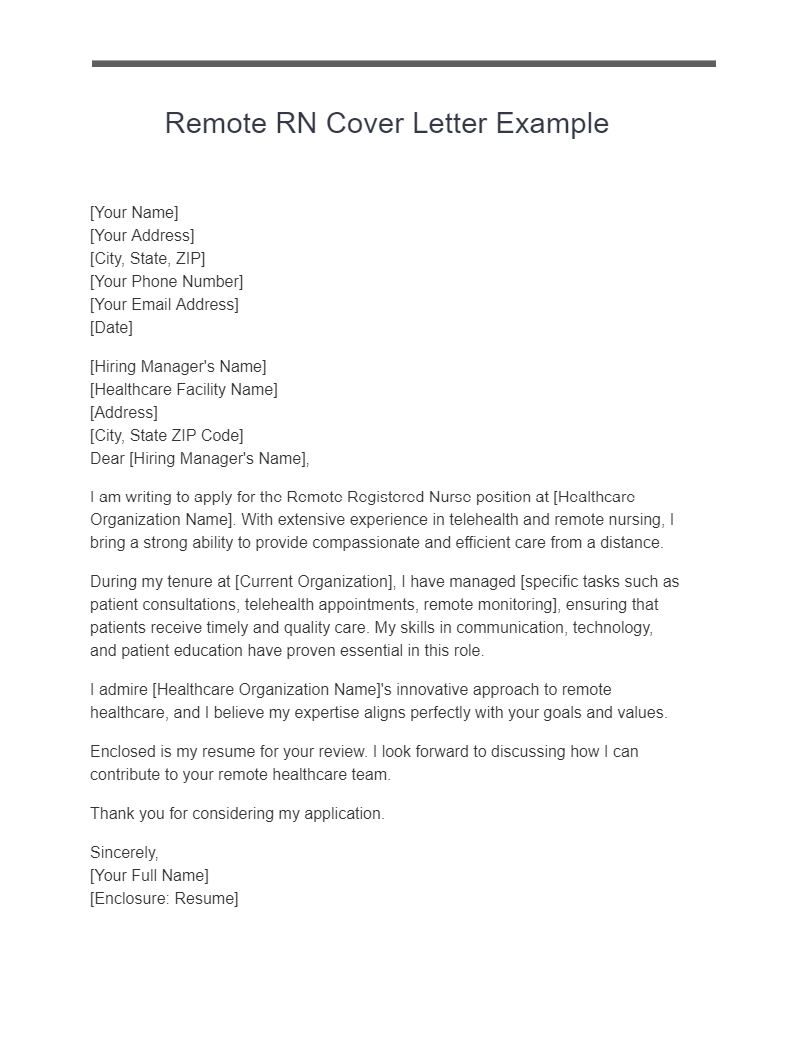
RN Cover Letter for Job Application Example
I am writing to apply for the Registered Nurse position advertised at [Healthcare Facility Name]. My nursing background, clinical expertise, and commitment to patient-centered care make me a strong fit for this role.
In my previous role at [Former Healthcare Facility], I was responsible for [specific duties such as patient assessments, care planning, team coordination]. My success in these areas can be attributed to my dedication to continuous learning and collaboration with multidisciplinary teams.
What attracts me to [Healthcare Facility Name] is your focus on [mention specific values or initiatives]. I am confident that my skills and values align with those of your organization.
Please find my resume enclosed. I look forward to the opportunity to discuss my qualifications further.
An RN cover letter for a job application should be tailored to the specific job posting. Focus on how your experience and skills align with the responsibilities and values mentioned in the advertisement. Make sure to express your enthusiasm for the role and how your background matches the facility’s needs.
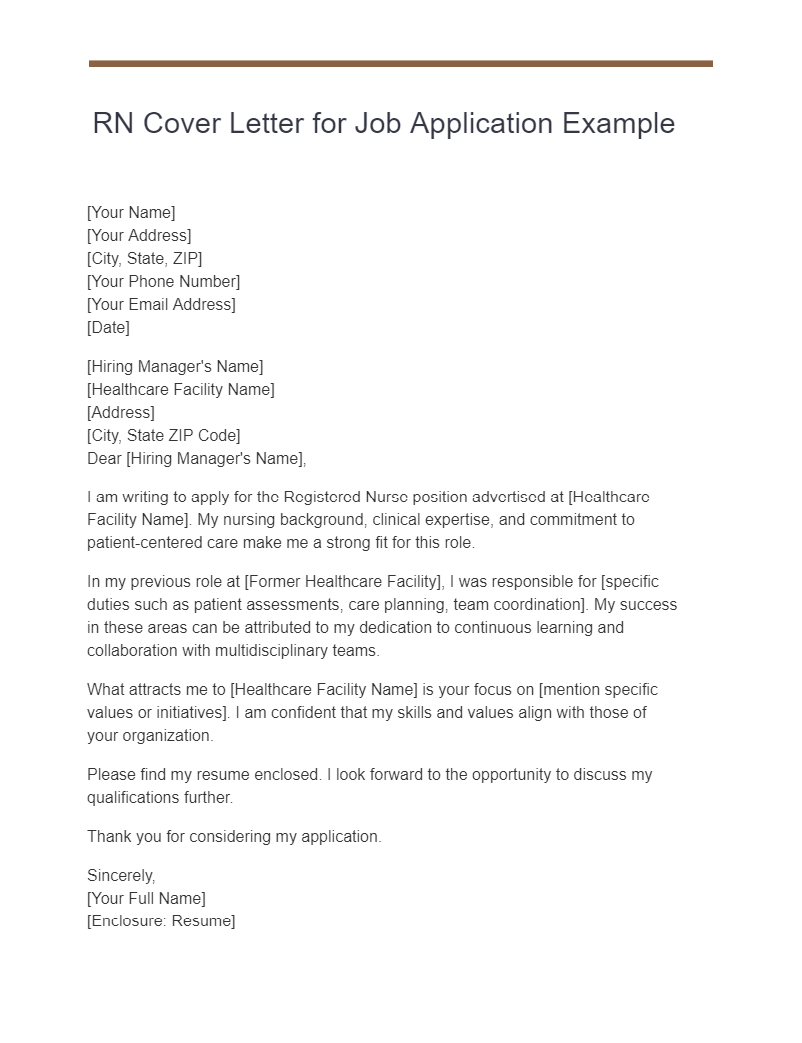
Telehealth RN Cover Letter Example
I am writing to apply for the Telehealth Registered Nurse position at [Healthcare Organization Name]. With specialized experience in telehealth, I am adept at leveraging technology to provide patient care across distances.
At [Current Organization], I have led telehealth initiatives, conducting virtual consultations, monitoring patient progress, and educating patients on health management. My commitment to accessible healthcare aligns with [Healthcare Organization Name]’s mission to expand care to underserved communities.
I look forward to the opportunity to contribute to your telehealth team and help advance your innovative approach to healthcare.
Enclosed is my resume for your consideration.
A Telehealth RN cover letter should showcase your skills in virtual healthcare delivery. Highlight specific initiatives, experiences, and technologies you have worked with, and align your mission with the organization’s focus on accessible and innovative healthcare.
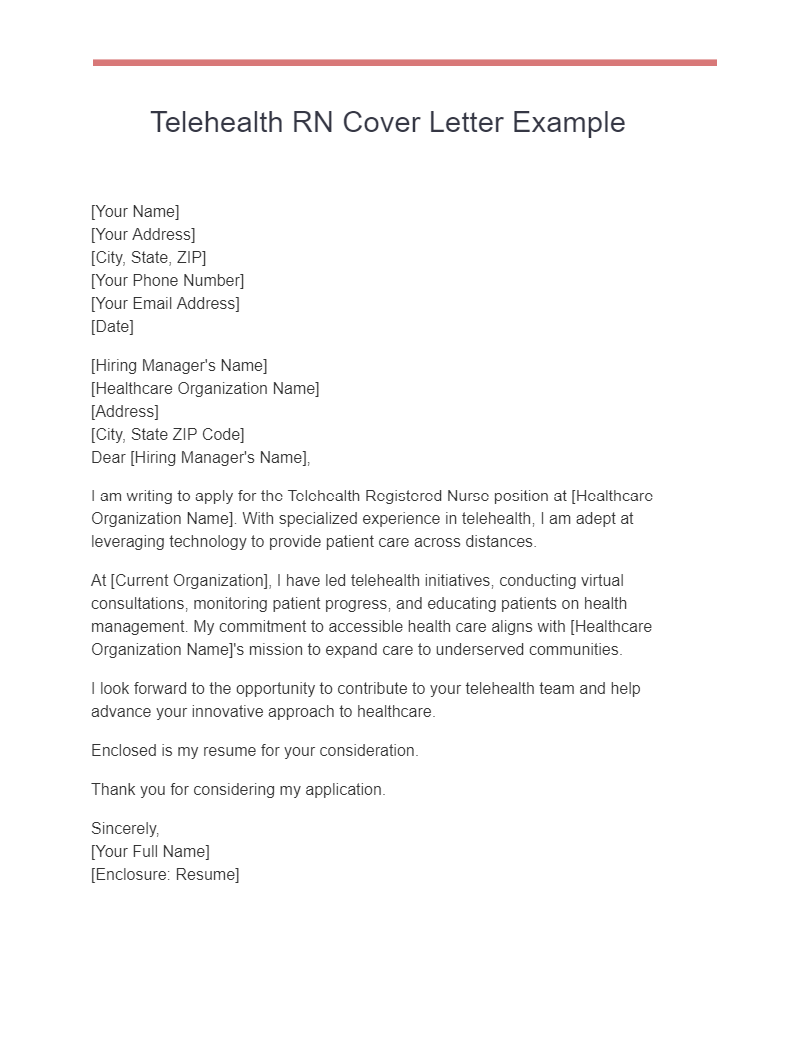
What do you write in a Cover Letter for a Registered Nurse Role?
When writing a cover letter for a Registered Nurse role, it’s crucial to address specific aspects of the nursing profession. Key points to include are:
1. Introduction: Introduce yourself and mention the nursing position you’re applying for. 2. Professional Experience: Highlight your relevant nursing experience, skills, and areas of specialization. 3. Education and Certifications: Mention your nursing degree and any specialized certifications. 4. Compassion and Commitment: Emphasize your dedication to patient care and healing. 5. Alignment with Organization’s Values: Research the healthcare facility’s mission and express how it resonates with your professional ethos. 6. Call to Action: Include a closing statement expressing your desire for an interview or further discussion.
How Do I Write a Cover Letter for a Registered Nurse?
Writing a cover letter for a Registered Nurse role requires a focused approach. Here’s how you can do it:
1. Start with Research: Understand the specific needs and values of the healthcare organization. 2. Use Professional Tone and Format: Keep the tone professional and follow a standard cover letter format. 3. Highlight Relevant Skills: Focus on nursing skills like patient care, clinical expertise, team collaboration, and any specialized training. 4. Showcase Accomplishments: Provide examples of your successes in previous roles. 5. Personalize Your Cover Letter: Tailor your cover letter to the specific RN position, referencing the job posting.
Tips for Writing a Registered Nurse Cover Letter
Writing a standout Registered Nurse cover letter requires careful consideration. Here are some specific tips:
1. Be Specific and Concise: Clearly articulate your qualifications without unnecessary filler. 2. Use Action Verbs: Utilize action verbs like ‘administered,’ ‘coordinated,’ ‘led,’ to demonstrate your experiences. 3. Include Real Examples: Share tangible examples of how you’ve impacted patient care or improved processes. 4. Express Passion for Nursing: Show your genuine passion for nursing and commitment to patient wellbeing. 5. Proofread Carefully: Ensure there are no typos or grammatical errors.
Crafting a compelling Registered Nurse cover letter involves articulating your professional experience, passion, and alignment with the healthcare organization’s mission. It serves as a personalized introduction that demonstrates why you are the ideal candidate for the role.
Text prompt
- Instructive
- Professional
Write a cover letter for a college student applying for an internship at an educational technology company
Form a cover letter for a high school student seeking a part-time job at a local bookstore.
Resume Worded | Career Strategy
14 registered nurse cover letters.
Approved by real hiring managers, these Registered Nurse cover letters have been proven to get people hired in 2024. A hiring manager explains why.

Table of contents
- Registered Nurse
- Pediatric Registered Nurse
- Pediatric Nurse Practitioner
- Intensive Care Unit (ICU) Registered Nurse
- Emergency Room (ER) Nurse
- Nurse Practitioner
- Clinical Nurse Specialist
- Emergency Room (ER) Registered Nurse
- Alternative introductions for your cover letter
- Registered Nurse resume examples
Registered Nurse Cover Letter Example
Why this cover letter works in 2024, high patient satisfaction rate.
Highlighting a specific achievement, like the 98% patient satisfaction rate, shows the direct impact of your work on patients and the organization. This gives the hiring manager a clear understanding of your capabilities and potential contributions to their company.
Reducing Medication Errors
By sharing an example of a successful initiative that you led, you demonstrate your ability to take action, solve problems, and create positive change. This proactive attitude is attractive to employers and helps set you apart from other candidates.
Excitement for Diverse Opportunities
Expressing genuine enthusiasm for the specific aspects of the role or company shows that you have done your research and are genuinely interested in the position. This helps you connect with the hiring manager and makes your application more memorable.
Showcasing Relevant Skills and Achievements
By sharing your previous role, skills developed, and achievements, you are building a strong case for yourself, and it is clear how well you might fit in the new role. Mentioning the high patient satisfaction score quantifies your success and adds credibility to your claims.
Demonstrating Leadership and Initiative
Leadership and initiative are highly valued in nursing. When you discuss how you've led initiatives that improved patient care, you're showing that you're proactive and capable of making significant contributions beyond your regular nursing duties. It's a surefire way to show your potential to take on more responsibilities and positively influence the work environment.
Showcasing Initiative and Leadership
Here's what stands out: not only did you take the initiative to drive patient care improvements, but you also highlighted your leadership skills. You've shown that you can devise and execute plans that yield measurable results - that's a big tick in my book! It shows you can make a tangible impact at Johns Hopkins Hospital.
Highlighting Cross-functional Team Leadership
I love that you mentioned your experience leading a cross-functional team to improve an important aspect of healthcare - emergency response. It speaks volumes about your ability to collaborate, lead and drive results, irrespective of the team composition. It reassures me that you can thrive in our diverse team environment.
Stating Personal Motivation
Sharing your personal motivation for nursing shows me you're not just in it for the paycheck. Seeing patients' resilience and hope fuel your passion tells me you're likely to stay committed and motivated, even through tough days. It gives me a glimpse into your emotional resilience, which I value in a nurse.
Aligning with Organizational Values
By pointing out that your commitment to continuous learning aligns with our institution's emphasis on professional growth, you're showing me that you're likely to fit well within our culture. If your values align with ours, you're more likely to be satisfied and productive in your job.
Reasserting Enthusiasm and Offering Unique Blend
Reasserting your enthusiasm to bring your unique blend of experience, dedication and passion for nursing to our team is a powerful closing. It leaves me with a strong impression of your commitment and excitement for the role, making me more likely to remember your application.
Show your personal connection to nursing
Sharing a personal story, like how your grandmother's care inspired your career, helps me see your true motivation. It connects your heart to your job choice.
Highlight specific skills and success
Detailing your experience with cardiology patients and your role in improving patient satisfaction and reducing readmission rates shows you are not just skilled but also impactful.
Show how you fit in the role
Explaining your strengths in clinical skills and passion for patient education clearly outlines why you are a good choice for our team.
Connect with our values
Mentioning your alignment with our commitment to exceptional care and a supportive environment tells me you've done your homework and understand what we value.
Express eagerness to contribute
Ending with your anticipation for a discussion about your fit for the role demonstrates both professionalism and enthusiasm.
Does writing cover letters feel pointless? Use our AI
Dear Job Seeker, Writing a great cover letter is tough and time-consuming. But every employer asks for one. And if you don't submit one, you'll look like you didn't put enough effort into your application. But here's the good news: our new AI tool can generate a winning cover letter for you in seconds, tailored to each job you apply for. No more staring at a blank page, wondering what to write. Imagine being able to apply to dozens of jobs in the time it used to take you to write one cover letter. With our tool, that's a reality. And more applications mean more chances of landing your dream job. Write me a cover letter It's helped thousands of people speed up their job search. The best part? It's free to try - your first cover letter is on us. Sincerely, The Resume Worded Team
Want to see how the cover letter generator works? See this 30 second video.
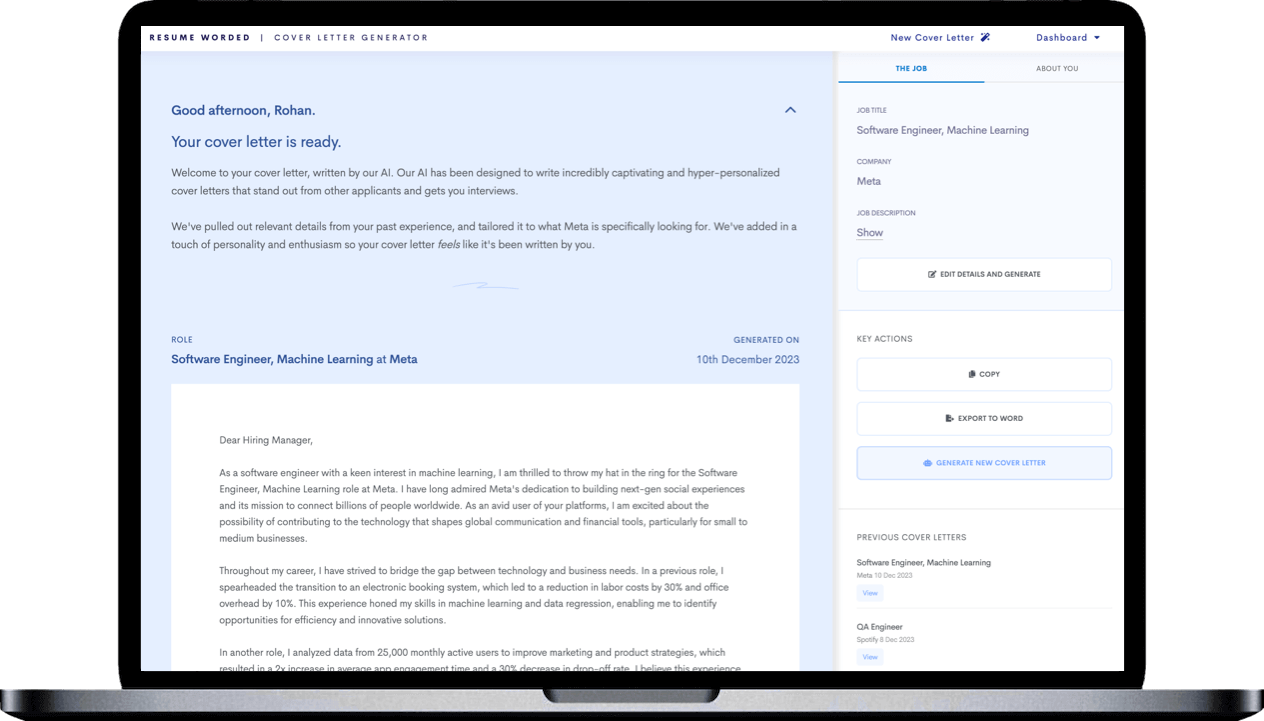
Start with your enthusiasm for nursing
Beginning your cover letter by sharing your excitement for the registered nurse position immediately captures attention.

Showcase your dedication to patient care
Mentioning specific projects that improved patient satisfaction demonstrates your commitment to making a real difference in healthcare.
Emphasize teamwork and clinical skills
Highlighting your ability to work well with others and your strong clinical skills tells me you're a well-rounded candidate.
Share your passion for patient education
Your interest in community outreach and patient education aligns with the growing focus on preventative care in nursing.
Close with a call to action
Ending your cover letter by looking forward to a discussion about your fit for the role is a good strategy to prompt a response.
Show your passion for nursing clearly
Talking about your passion for providing exceptional patient care right away shows me you are not just looking for any job, but you genuinely care about your work and the people you help.
Highlight your achievements in nursing
When you mention specific accomplishments, like reducing readmission rates, it gives a clear picture of your ability to make real improvements in patient care. This is exactly what hiring managers want to see.
Demonstrate teamwork in patient care
By saying you work well with other healthcare professionals, you're telling me you understand the value of teamwork in providing top-notch patient care, which is critical in a hospital setting.
Being proactive about wanting to bring your skills to improve our programs, especially something innovative like telehealth, tells me you're not just looking for a job but to make a difference.
Show gratitude in your closing
Ending your letter by thanking the hiring manager for considering your application is polite and shows you value their time and the opportunity to apply.
Pediatric Registered Nurse Cover Letter Example
Highlighting specialized skills and empathy.
When you highlight your pediatric nursing skills and understanding of young patients' unique needs, you're clearly communicating your specialty and expertise. Mentioning your ability to establish rapport with children demonstrates your empathy, a critical quality in pediatric nursing. This can convince recruiters of your aptitude and suitability for the role.
Proactive Problem-solving
Discussing how you've implemented innovative solutions to improve patient care shows your ability to think on your feet and proactively solve problems. Your mention of increased patient understanding due to your efforts also quantifies your impact and shows how your actions led to tangible improvements in patient care.
Pediatric Nurse Practitioner Cover Letter Example
Demonstrating impact on patient experience.
By illustrating how your innovative approach improved the patient experience and increased efficiency, you're telling me you can directly impact two crucial aspects of healthcare delivery. I appreciate solutions that address both patient satisfaction and operational efficiency, so this is a big win in my book!
Applying a Holistic Approach
Sharing your experiences in community outreach programs tells me you understand the broader needs of pediatric patients. Seeing the big picture and applying a holistic approach is a highly valued trait in pediatric healthcare. It gives me confidence that you would bring a valuable perspective to our team.
Sharing Excitement for Shared Beliefs
Expressing your excitement about potentially working at our hospital, especially because it aligns with your belief in making a real difference, tells me your passion goes beyond the job. This shared belief can act as a strong motivator and makes you a highly desirable candidate.
Passion for Research and Innovation
Showing your interest in contributing to advancements in pediatric care resonates with our mission. Your passion for research and innovation could mean you'll bring fresh ideas and keep pushing the boundaries, which is something we highly appreciate in our team.
Closing with a Commitment to Contribution
Ending your cover letter by expressing your eagerness to contribute to our work leaves a strong impression. It ties together your skills, experience, and passion, and shows me you're focused on enhancing pediatric care at our hospital.
Intensive Care Unit (ICU) Registered Nurse Cover Letter Example
Share your inspiration for icu nursing.
Telling us about your father's experience in the ICU offers a powerful reason for your career path, showing your deep understanding of the role's importance.
Demonstrate your expertise in critical care
Discussing your experience with complex cases and your success in reducing infection rates highlights your competence and dedication to improving patient outcomes.
Show your readiness for the team
Expressing confidence in your critical care expertise and commitment to improvement tells me you are prepared to add value to our ICU team.
Invite further discussion on your application
Closing with an invitation to discuss your application further shows your proactive approach and interest in joining our team.
Connect your values with the employer's
Mentioning that you're drawn to the facility's reputation for high-quality care shows that you've done your homework and are serious about wanting to be part of their team.
Quantify your nursing impact
Describing how you improved patient outcomes with hard numbers, like reducing mortality rates, provides tangible evidence of your skills and the positive impact you can have.
Share your enthusiasm for the role
Expressing excitement about joining the team and your dedication to critical care nursing helps me see your genuine interest and how you envision making a contribution.
Be courteous in your application
Acknowledging the time taken to review your application is a respectful and professional touch.
Invite further discussion
Offering to discuss how your skills and experience match the hospital's needs in more detail is a proactive approach, showing you're ready and eager to move forward in the hiring process.
Emergency Room (ER) Nurse Cover Letter Example
Show your early passion for er nursing.
Talking about your early interest in the emergency room sets a strong foundation for your career choice. It shows you have a long-standing commitment to this challenging field.
Highlight your achievements in emergency care
By mentioning specific improvements you've made, like reducing wait times, you prove your impact. This tells me you're not just doing the job; you're improving how it's done.
Demonstrate leadership in the ER setting
Your experience as a preceptor showcases your ability to lead and educate others, an essential skill in high-pressure environments.
Connect with the hospital's mission
Expressing why you're drawn to the hospital’s commitment to innovation shows you’ve done your research and are a match for their values.
Express eagerness to join the team
Your closing reaffirms your interest and invites further discussion, which is a proactive step in the application process.
Nurse Practitioner Cover Letter Example
Show your nurse practitioner passion and experience.
When you talk about your love for the job and years of work, it helps me see you’re not just looking for any job, but a place where you can use your skills and care deeply about your work.
Quantify your nursing achievements
Telling me about the number of patients you've managed and the success of your programs gives a clear picture of your ability to handle responsibility and make real changes.
Connect with the employer's values
By mentioning your shared interest in helping those less fortunate, you’re showing you’re not just a fit for the job, but also for our culture and mission.
Express gratitude and eagerness
A simple thank you goes a long way, and showing excitement about the role makes me think you’ll bring positive energy to our team.
Asking to talk more about how you can help us succeeds tells me you’re ready to be an active participant in our success, not just an employee.
Clinical Nurse Specialist Cover Letter Example
Highlight clinical nurse specialist expertise.
Starting with your years of experience and specific passion for clinical excellence makes me confident you have the foundation needed to contribute significantly to our team.
Show impact on patient care and nursing practice
Discussing your direct involvement in improving patient outcomes and enhancing nursing skills demonstrates that you’re a proactive and effective leader in healthcare.
Align with the organization's mission
Your excitement about our commitment to innovation shows me you’re looking to grow with us and contribute to our evolving approach to care.
Express enthusiasm for the role
Letting me know you’re eager to bring your passion to our organization makes me believe you will be a dedicated member of our team.
Propose a future conversation
Inviting a discussion about how you can contribute to our mission tells me you’re serious about making a difference in our organization and for our patients.
Emergency Room (ER) Registered Nurse Cover Letter Example
Connect with the employer's mission as an er nurse.
Talking about your admiration for the hospital's commitment to quality care shows you share their values. This is a strong start as it aligns your personal and professional goals with those of the potential employer.
Show your ER nurse skills under pressure
When you highlight your ability to think critically and remain calm in emergencies, you're directly addressing key qualities that an emergency room nurse needs. This reassures the hiring manager of your capability to handle the intense environment of an ER.
Express your eagerness to grow and contribute
By stating your excitement about bringing your skills to their team, you are not just showing enthusiasm but also a willingness to continue learning and contributing positively to patient care. This shows you're a proactive and forward-thinking candidate.
Be grateful in your closing
A simple thank you can go a long way. It shows your appreciation for the opportunity to apply and your respect for the hiring manager's time in reviewing your application.
Ending your cover letter by looking forward to a discussion about how your qualifications meet their needs is a smart move. It's a call to action that prompts the hiring manager to consider your application further and potentially reach out for an interview.
Alternative Introductions
If you're struggling to start your cover letter, here are 6 different variations that have worked for others, along with why they worked. Use them as inspiration for your introductory paragraph.
Cover Letters For Jobs Similar To Registered Nurse Roles
- Certified Nursing Assistant Cover Letter Guide
- Director of Nursing Cover Letter Guide
- Experienced Nurse Cover Letter Guide
- ICU Nurse Cover Letter Guide
- New Grad Nurse Cover Letter Guide
- NICU Nurse Cover Letter Guide
- Nurse Case Manager Cover Letter Guide
- Nurse Practitioner Cover Letter Guide
- Nursing Student Cover Letter Guide
- Nursing Supervisor Cover Letter Guide
- Psychiatric Nurse Cover Letter Guide
- Registered Nurse Cover Letter Guide
- Travel Nurse Cover Letter Guide
Other Medical Cover Letters
- Care Coordinator Cover Letter Guide
- Case Manager Cover Letter Guide
- Dental Assistant Cover Letter Guide
- Medical Technologist Cover Letter Guide
- Microbiologist Cover Letter Guide
- General Nurse Cover Letter Guide
- Occupational Therapist Cover Letter Guide
- Pharmacy Technician Cover Letter Guide
- Radiologic Technologist Cover Letter Guide
- Respiratory Therapist Cover Letter Guide
- Therapist Cover Letter Guide

Thank you for the checklist! I realized I was making so many mistakes on my resume that I've now fixed. I'm much more confident in my resume now.


IMAGES
VIDEO
COMMENTS
If you're exploring job descriptions in the health care field, such as a registered nurse, you may encounter employers that require you to upload a cover letter with your resume and job application. Writing a c…
Applying for a Registered Nurse (RN) position requires more than just a strong resume; it demands a well-crafted cover letter that tells your unique nursing story. In an industry where compassion and dedication are key, an RN …
A well-crafted cover letter is essential for a Registered Nurse aiming to stand out in a competitive job market. It should succinctly highlight your relevant experience, clinical …
Write a targeted RN letter and they’ll be calling stat. In this article, you’ll get: Two sample RN cover letters: one for senior and one for new grad RN jobs. Steps to write a flawless cover letter for RNs. A template cover letter for …
14 Registered Nurse Cover Letters. Approved by real hiring managers, these Registered Nurse cover letters have been proven to get people hired in 2024. A hiring manager explains why.
Learn how to write a nursing cover letter. Get expert tips and downloadable cover letter examples for all levels of experience.